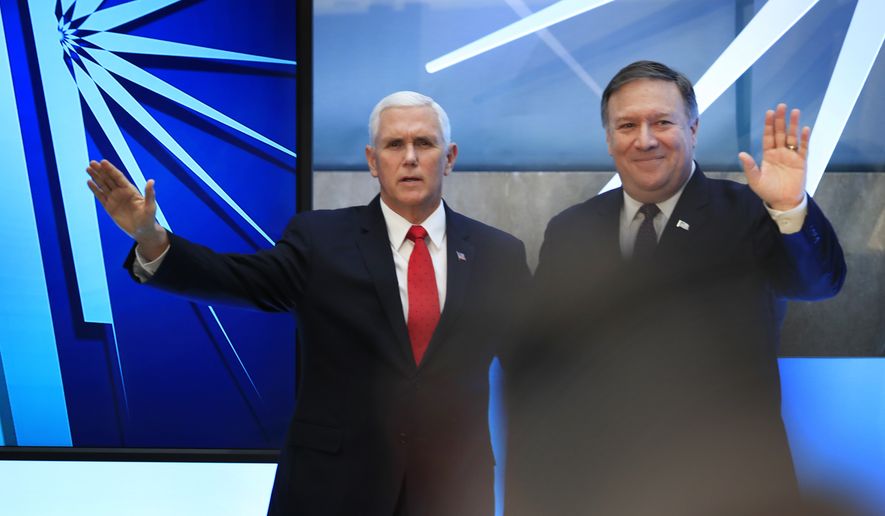OPINION:
The State Department, coming off its inaugural Ministerial to Advance Religious Freedom conference in Washington, D.C., just put out a notice to governments of the world to start taking the issue of individual religious liberties a bit more seriously.
Awesome. About time. But then again, this is simply a baby step down a mega-miles-long road.
First, the bad: The problem with telling other countries they need to shape up is that without an “or ship out” caveat, the telling is just that — talk.
The Potomac Declaration, as this State Department document has been dubbed, along with its accompanying plan for action, make some great points and much-needed recommendations. But what about enforcement? Does it have any teeth?
Not much there.
Then again — it’s not intended to be a War Declaration.
Segue, the good: Even without bite, the Potomac Declaration is hardly a waste of time. After all, action doesn’t occur absent thoughts and discussion. Laying out a standard of religious liberty in writing gives leaders around the world something to chew on, something to mull, consider, debate and discuss — and hopefully, one day, to enact.
It gives a starting point for discussion. And it makes clear that the United States considers religious freedom a top priority — a little bit of insight countries currying America’s favor might want to keep in mind.
“The Potomac Declaration is a formal affirmation that says right up front that the United States takes religious freedom seriously, that we will work with others around the world to help those under attack for their beliefs, and that we expect leaders around the world to make it their priority as well,” said Secretary of State Mike Pompeo, the Hill reported.
Formality is good. Putting pen to thoughts and issuing carefully constructed creeds serves not just as a clarifier, but also as a fall-back when diplomacy dips. (’No, we’re not giving you that financial assistance, your citizens are being jailed for their religious beliefs. Didn’t you read our Potomac Declaration?’)
Now to the sad reality: Yet formality only goes so far.
The Potomac Declaration states the “people ought to be able to change their beliefs, to convert to a new religion;” that “religious speech should not be suppressed under the guise of national security;” that “nations have no right to pick and choose which religions will be tolerated in their countries;” and that all laws regarding blasphemy should be repealed, as CBN News noted.
How to make other nations adopt those recommendations, though?
Look how long it took Saudi Arabia, land of the Wahhabism and strict Islamic rule, to even allow women to drive. Can you imagine how long it would take countries guided by sharia to give up the insistence on all Muhammad, all the time, and to welcome with open arms those who worship Jesus — or a tree spirit, for that matter?
“States should promote religious freedom and bring their laws and policies into line with international human rights norms regarding freedom of religion or belief,” the text of the Potomac Declaration states. “Protect freedom of thought, conscience, religion, or belief … Allow religious communities to establish freely accessible places of worship … Treat all persons equally under the law … Prevent discrimination on the grounds of religion,” and so forth, and so on.
There are great principles — very American principles. But sadly, the nations that need to implement them the most, probably won’t.
If the United States really wants to get serious about religious liberty, then some day, one day, leaders will have to back the strongly worded bark with financial bite. No religious liberty? No U.S. aid. No freedom to worship as one chooses? No U.S. bailouts, funding or resources.
Now there’s a political quagmire for you. Can you imagine the outcry?
That right there is probably why religious freedom, around the world and as America envisions it, will come slowly — molasses slowly — if at all. That right there is the sad reality of where America’s push for global religious freedom stands.
Balancing the political needs of America and America’s allies with the religious liberties of individuals around the world — of individuals who live in countries both friendly and unfriendly to the West — will always be a tightrope walk and a give-and-take dance that will leave some without full freedoms. That’s just the truth of foreign affairs.
Still, it’s good of this administration to set religious liberty as a high priority. All journeys, after all, start with a single step.
• Cheryl Chumley can be reached at cchumley@washingtontimes.com or on Twitter, @ckchumley.




Please read our comment policy before commenting.